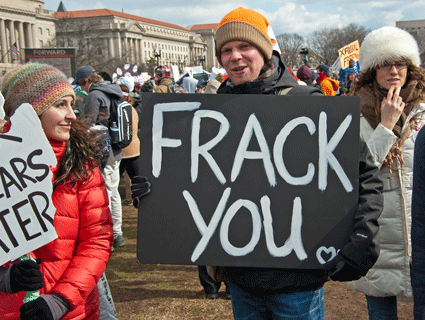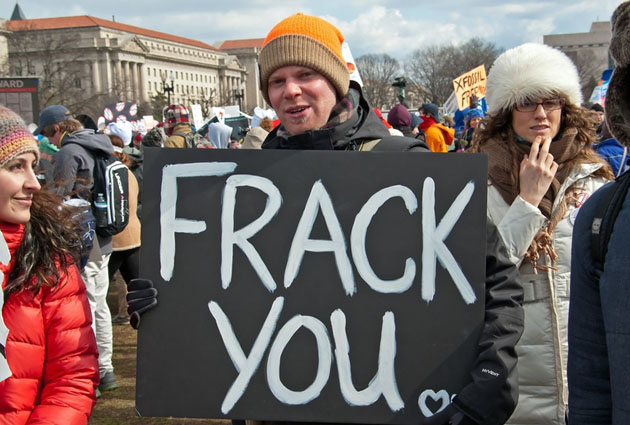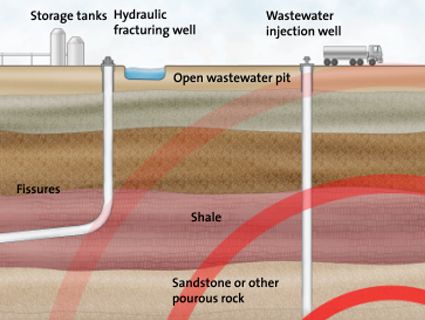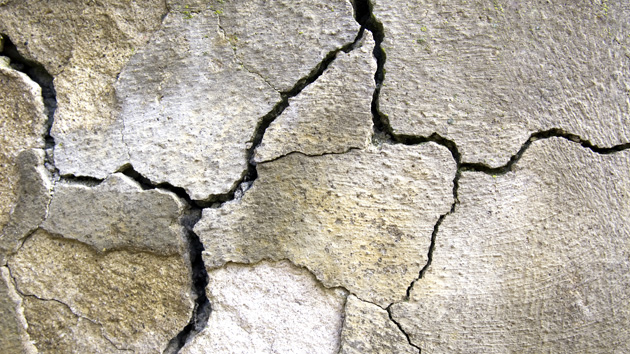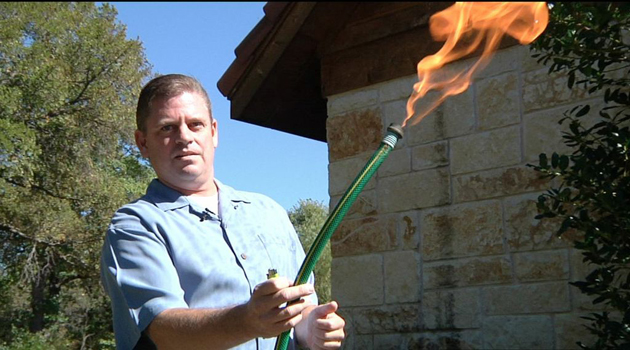
HBO
Movie sequels are typically reserved for superhero franchises (and occasionally Michael Bay). Not scrappy social-issue documentaries. But director Josh Fox’s 2010 documentary Gasland, which was nominated for an Academy Award, helped spark such an enormous national interest into the negative impacts of natural gas drilling that he decided to make a sequel.
“When we put the first movie out we were astounded,” Fox recently told Mother Jones. “We…never figured that ‘fracking’ would become a household word.”
Gasland ended with coverage of a June 4, 2009, hearing by the House Energy and Minerals subcommittee that addressed the safety and risks of natural gas drilling. Fox narrates, “The FRAC Act is making its way through Congress, and industry is lobbying hard against it.” The FRAC Act called for the removal of hydraulic fracturing’s exemption from the Safe Drinking Water Act, and would have implemented federal regulation of the industry. But the bill never received a vote.
Gasland Part II premieres tonight on HBO and picks up in the spring of 2010, with Fox touring the Gulf of Mexico by helicopter. Below, oil from BP’s exploded Deepwater Horizon rig streams along the surface. Through voiceover, Fox explains how difficult it was to get clearance to fly in the area. “Journalists would call up the FAA to clear flights,” he says, “and BP would answer the phone.” It’s an emotional sequence, which immediately sparks a sense of injustice and opens up the film’s broad theme of industry influence on government.
Here’s the trailer:
Fox spoke to Mother Jones about his films and government policy immediately following President Obama’s major June 25 speech on climate change:
Mother Jones: What are your initial thoughts on the president’s speech and his push to reduce carbon emissions and increase renewables?
Josh Fox: It’s remarkable to watch the president, with all the weight of his ability to command rhetoric with the bully pulpit behind him, make a clear speech about climate change and why that’s so important for us all to focus on. And that is a rather remarkable thing to see. It’s enormously powerful. So the emphasis on why climate change is important and why we should focus on it is amazing. It’s exactly what we need. However, the plan itself is completely wrong.
By supporting fracked gas in the United States on a huge scale, both in terms of converting power plants to natural gas and export, and supporting fracked gas in other countries, he will undo all of the good that he’s putting forward in his speech. We know now that fracked gas is the worst fuel you can develop with respect to climate change. The reason is very simple, which is that methane, when it’s in the atmosphere, is up to 105 times more potent at warming the climate than CO2 is in a 20-year time frame—in this short window of time that we have now to tackle climate.
And what we’re looking at now is: in the field, in the recent data that’s coming in, up to 9 percent leakage in gas fields in Colorado and Utah. New York City, the transmission system is leaking methane into the atmosphere at a rate of about 3 percent. In Los Angeles, where they both produce and deliver natural gas, we’re at a rate of 17 percent leakage. Which means, it’s 17 times more powerful than coal.
So when you’re saying we want less carbon emissions from our power plants and you’re not looking at the whole life cycle of greenhouse gas, it’s extremely ironic that you’re sitting here making a speech about greenhouse gas emissions and advocating the development of a greenhouse gas. Methane: the second most important greenhouse gas in a 100 year time frame and the most important greenhouse gas to control in the 20-year time frame.
Watch more of Fox’s response here, via a Skype interview:
MJ: What about the mention in the speech that natural gas is “the transitional fuel that can power our economy with less carbon pollution, even as our businesses work to develop and then deploy more of the technology required for the even cleaner economy of the future”? He also made that analogy of taping the breaks before slowing down.
JF: We’re heard this over and over again. Natural gas is a bridge fuel. But it’s not a bridge—it’s a gangplank. It’s either a bridge in space or a bridge in time. The bridge in time we don’t need. We have renewable technology right now. We should not be converting or creating a single new natural gas fire power plant. We can do all of this with the wind and the sun. We should be moving vigorously towards renewable energy. The technology of which is right here right now.
I think that what we’re seeing is that folks are going to have to make this point very clear to the president: that fracked gas is not the way to go. And that this is a wholehearted embrace of fracked gas in that speech. And I really hate to be Debbie Downer right now, because everyone would love to say, “Yeah, we’re finally doing something on climate!” And there are good things in this. Absolutely you have to reduce carbon emissions from coal-fired power plants. That’s a no brainer. The question is what do you replace them with? And if you’re replacing them with gas, you’re not actually creating a better situation with respect to greenhouse gas emissions in the lifecycle as a whole.
MJ: Do you know of or do you support any regulations that may actually be beneficial to cleaning up natural gas drilling?
JF: Once you’ve contaminated an aquifer, the contamination is pretty much there to stay. You can’t get the volatile organics, the benzenes, the BTEX, you can’t get that back out again. It’s very difficult to do. So there’s no such thing as really remediating aquifers. You can treat the water at the surface, but then you’ve committed yourself to centuries of water treatment, which is both costly in terms of money and in terms of energy.
What I have found out is that in terms of the well failure rate—when you’re talking about “Why are these wells leaking?”—well, we know that the cement that is supposed to protect aquifers breaks down and cracks at enormous rates. So 5 percent of these wells leak immediately upon installation, and up to 50 to 60 percent of them start leaking over a 30-year period. So in a couple of decades you have half of the wells that are drilled right now, and you’re talking about numbers in the millions of wells drilled, leaking. That’s a huge crisis in terms of water contamination. There’s no way to fix that problem.
MJ: So it’s impossible?
JF: When you have a place right now, like places I know in Wyoming or Texas or Pennsylvania, where people are being toxically poisoned in their own homes by emissions that could be handled, or where people are suffering the effects of water contamination and need redress and need those companies to be responsible for the destruction of their homes, for the destruction of their lands, for the destruction of their towns, that absolutely has to be done. There are regulations all over the spectrum that have to be done to the existing situation right now. But the only policy that makes sense is a nationwide moratorium: no new fracking, no new fracked wells.
MJ: Regarding the film specifically, was there always an intention for the sequel? Even in the back of your mind?
JF: No, I don’t think so. When we put the first movie out, look, we were astounded. The first movie was essentially intended for my basic, general area. Like a 25-mile radius around my house in the upper Delaware River basin. The fact that it went further than that, the fact it went to 30 countries and has a viewership in the tens of millions, 50 million in all these places, on television, is absolutely astounding. We also never figured that “fracking” would become a household word, that it would become such a huge issue. I think what we saw though is that our worry on this was concurrent with a lot of other people. That when the natural gas industry was knocking on my door, they were knocking on the door of millions of people. And that became something that Americans really needed to focus on.
For those people who are going to tune in strictly for the pyrotechnics, we have better and bigger explosions. That’s a prerequisite of any sequel. But in terms of this, what we’re really monitoring is watching the gas industry light our institutions, light our regulatory agencies, light our democracy on fire.
Watch more of Fox’s response here, via a Skype interview:
MJ: There’s a scene toward the end of the sequel where one of your sources calls you on the phone and describes an interaction they have with an EPA representative who was told by “higher-ups” to back off of their investigation into water contamination. Can you expand on what you know about that?
JF: EPA’s a lot of great people. They’re a lot of great scientists and their mission is to protect people. It’s the Environmental Protection Agency, but it’s really a people protection agency. And they’re out there trying to do their job and do the science. And the level of depression and dismay and shock among mid-level EPA folks who are out there doing the work, and then to watching policy come in and take away the things that they’re trying to do—sometimes I feel like there isn’t enough Prozac in the world to make those people feel better about their jobs. They’re going out there, they’re trying to protect Americans and then time and time and time again they get their knees cut off at the policy level.
We’re not living in a society that science actually dominates the conversation. We’re living in a situation where some science is allowed and a lot of it’s about policy. And when your science runs into a policy roadblock, all of a sudden the science starts to disappear. You have a lot of the folks, mid-level EPA, not just calling the residents, saying, “Oh by the way, although the head office said this was all fine: Don’t drink your water.” A lot of people calling me, saying, “Oh, by the way, Josh, there’s a report that you need to know about it’s in this office. I couldn’t take it with me when I resigned, but you can find out how to shake it loose.” A lot of calls like that.
MJ: In the first Gasland you show a letter you received in the mail from a natural gas company, which offered to pay nearly $100,000 to lease your land for drilling. But you didn’t accept the offer. And you’ve stood firm against it over these last few years, considering that you could have benefited financially.
JF: Absolutely not, I absolutely would have not benefited financially.
MJ: Even with the $100,000 offer?
JF: If they had drilled across from my house, the property value goes to zero. But there’s more than just financial benefits in this world. When you live in a watershed area, in a pristine area, and you could watch this whole place fall apart in front of your eyes, you don’t sell your soul for a buck. It’s just not the way it works. And when you actually understand what this means, when you understand the thousands of truck trips, the leaking wastewater pits, the pipelines bisecting the woods, the volatile emissions that are going to creep into your window every night, the water contamination when we live off of a natural spring that has been there for 100 years. The costs far outweigh the benefits. Not just to the American people and the person who’s near the well, but in the long run.
MJ: At the end of the film you have that quote as you’re in the halls of Congress, being prevented from filming the hearing, and you say that “they’re burning the Constitution as a relic left behind.” Where do you stand as an optimist or pessimist considering just how much of a fight you’ve got?
JF: The first line in the first Gasland is: “I’m not a pessimist. I’ve always had a great deal of faith in people that we won’t succumb to frenzy or rage or greed. That we’ll figure out a solution without destroying the things that we love.” I have not lost that sense.
It is an incredibly hopeful experience watching communities come together and actually reassemble democracy. The democracy’s been taken away from us. But they’re reinventing democracy out there in rural Pennsylvania, in Philadelphia, in Pittsburgh. We had 1,700 people come to our grassroots tour in Pittsburgh. Seventeen hundred people on one night to watch a movie. Unreal. A thousand people in Williamsport, Pennsylvania; 800 people on one night came out in Bethlehem, Pennsylvania. There’s something really happening and really moving, and it’s exciting and it makes me very optimistic because it is going to be the engine for how we really combat climate change. Which is strong communities.
MJ: Do you have it in you to keep pushing your message and continuing for what could be the next few years?
JF: Five years went by in the blink of an eye working on this. I don’t think this is really about fracking anymore. It’s about who we are as a people, and that’s something that you can work on for your whole life. It’s about our democracy. And it’s incredibly inspiring to watch communities rally and people come together. And it’s happening on an enormous scale. We’re just starting to learn how many people out there who are working on this. There’s an anti-fracking organization in every tiny little town throughout the entire southern tier of New York state. What other political issue can you say that that exists about? None. And a fracking organization in every little town across Pennsylvania.
It’s remarkable to watch and just be a storyteller and a journeyman and watch it and talk to people. It’s the next phase of authorship of this country’s energy future. It’s gonna come from the people. It’s not gonna be deus ex machina or Obama ex machina, or science ex machina. It’s gonna be the people. It’s not going to be a wind energy company that comes in and saves the day. It’s going to be the people who figure this out. And I’m watching them figure a lot of stuff out and be very intelligent about how to make climate choices and how to make democracy choices, how to make energy choices. So I have faith in that. And it doesn’t get me tired—it gets me really excited.
